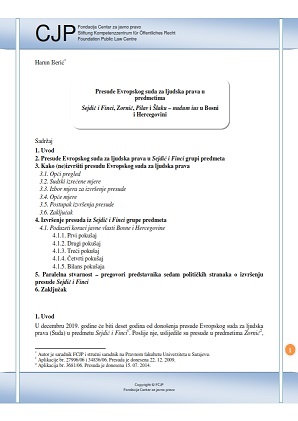Presude Evropskog suda za ljudska prava u predmetima Sejdić i Finci, Zornić, Pilav i Šlaku – nudum ius u Bosni i Hercegovini
Judgments of the European Court for Human Rights in Cases Sejdić and Finci, Zornić, Šlaku and Pilav – nudum ius in Bosnia and Herzegovina
Author(s): Harun Išerić
Subject(s): Constitutional Law, Human Rights and Humanitarian Law, Government/Political systems, Electoral systems, EU-Legislation, Court case
Published by: Fondacija Centar za javno pravo
Keywords: European Court; human rights; court case; Sejdić-Finci case; constitution; elections; public law;
Summary/Abstract: In December 2019 it will ten years of Sejdić and Finci judgment of the European Court for Human Rights. It was followed by Zornić, Šlaku and Pilav judgments. The Court found that Bosnian Constitution was not in the line with the European Convention for Human Rights. In Zornić and Šlaku judgments under Article 46 of the Convention, Court stated that in order to implement these judgments, Bosnia and Herzegovina would have to introduce constitutional and legislation amendments. All four attempts by B&H public authorities to enforce Sejdić and Finci group judgments were unsuccessful. These attempts were characterized by: a short deadline for the drafting constitutional amendments and amendments to the Electoral Law, failure to hold sessions of the working group/parliamentary commission due to the absence of its members and consequent lack of a quorum, apparent transparency in work and lack of will to fulfil the mandate of the working group/parliamentary commission and efforts to reach an agreement on amendments. Parallel to these formal attempts, there was non-institutional process with the aim to reach a political agreement on constitutional reform. This two years process involved seven presidents of parliamentary political parties and it was facilitated by European Union. The process was not transparent, public has no insights about different proposals and it was conducted only in closed circle of seven politicians. Eventually it did not deliver any results. In order to have Court’s judgments implemented, a few conditions need to be met: it has to be done within Parliamentary Assembly which has a competence to change constitution, Council of Europe bodies like Parliamentary Assembly, Secretary General and its member states should act in synergy to produce a pressure on Bosnia and Herzegovina to fulfil its international obligation such is Court’s judgment implementation and Bosnian politicians have to understand implementation of these four judgments as issue of the rule of law and not to use it for its party and ethnic interests.
Series: Fondacija Centar za javno pravo - Projekti
- Page Count: 30
- Publication Year: 2019
- Language: Bosnian
- Content File-PDF
- Introduction

